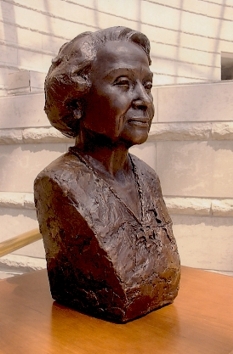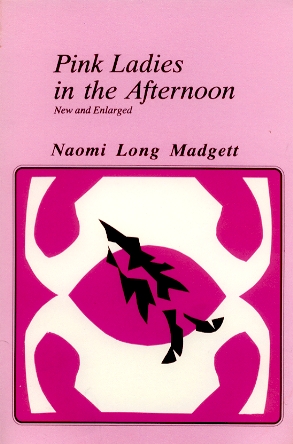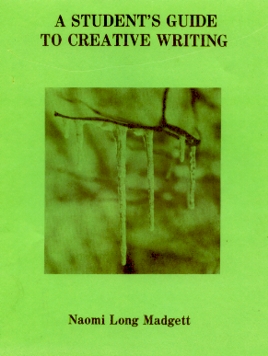Labor of Love: A Legacy
Dr. Naomi Long Madgett has dedicated much of her life to her passions: poetry, teaching, and advocating for better representation of African American literature in textbooks. Deservedly, her lifetime of impassioned work and impressive accomplishments has been recognized in many ways. Click here to read about all of her accomplishments and awards. Here are just a few of many highlights:
· Poet Laureate of the City of Detroit
· Winner of the 2012 Kresge Eminent Artist Award
· Author of 10 books of poetry, two textbooks, and editor of two anthologies
· Work appearing in more than 180 anthologies in the US and abroad
· Winner of an American Book Award
· Life-sized sculpture on permanent display at the Charles H. Wright Museum of African American History in Detroit
Feature
Publishing Profiles: Dr. Naomi Long Madgett of Lotus Press, Inc.
A Powerful Labor of Love
In the forty-one years that Lotus Press Inc. has been publishing quality poetry, its founder, editor, and publisher, Dr. Naomi Long Madgett, has never paid herself a penny for her services. In fact, she’s contributed a great deal of her own money to keep the press alive. “Serving as publisher of Lotus Press, Inc. has been a labor of love,” she told me.
Dr. Madgett’s love of everything poetry began at an early age, as did her talent for writing it. “I was just naturally drawn to poetry as a child,” Madgett said. Her father’s study was filled with books of many kinds, and Madgett found herself automatically reaching for the books of poetry first. “I still have my father’s copy of Negro Poets and Their Poems, edited by Robert Kerlin, published in 1923, the year I was born, so I became familiar with poetry by African Americans at an early age.”
Her love of poetry naturally blossomed into a talent for creating poetry; a talent that, as for many poets, was born out of a negative experience. Dr. Madgett explained her first poetry writing experience, telling me, “I didn’t have a sister but two older brothers, and the neighborhood was made up of only boys who played in our backyard. I was very lonely. When I was in third grade, my mother’s sister and her daughter, who was not much older than I, came to live with us. For the first time I had the companionship of another girl. After two years, they moved to another city, and I was devastated. The first poem I wrote expressed my loneliness when she left.”
 A few years later, in 1934, Madgett’s minister father sailed overseas as a delegate at the World Baptist Alliance convention in Berlin. Madgett worried for her father’s safety and expressed her fear in another poem. That poem was the beginning of many, and when she was just thirteen, Madgett’s first published poem appeared in the Orange (NJ) Daily Courier. By the time she was fifteen, Madgett had enough poems for a small book, Songs to a Phantom Nightingale, published (after a two-year delay) by Fortuny’s in 1941. She was seventeen years old.
A few years later, in 1934, Madgett’s minister father sailed overseas as a delegate at the World Baptist Alliance convention in Berlin. Madgett worried for her father’s safety and expressed her fear in another poem. That poem was the beginning of many, and when she was just thirteen, Madgett’s first published poem appeared in the Orange (NJ) Daily Courier. By the time she was fifteen, Madgett had enough poems for a small book, Songs to a Phantom Nightingale, published (after a two-year delay) by Fortuny’s in 1941. She was seventeen years old.
Thirty years later, in 1972, Dr. Madgett had a harder time publishing her poetry than she did as a young woman. According to the Lotus Press website, Dr. Madgett had a difficult time publishing Pink Ladies in the Afternoon because “[m]uch of the poetry by African Americans at that time was characterized by anger and rage, but Madgett’s poems were quiet and subtle and she was unable to find a publisher who would accept it.”
 Out of this roadblock, Lotus Press, Inc. was born with Madgett’s self-publication of Pink Ladies in the Afternoon. It was not Madgett’s intention to publish any additional poetry, but her passion for fair representation of African American literature in high school and college textbooks was the driving force for Lotus Press’ second publication: a portfolio of poems by living black authors intended for classroom bulletin boards, complete with a teacher’s guide.
Out of this roadblock, Lotus Press, Inc. was born with Madgett’s self-publication of Pink Ladies in the Afternoon. It was not Madgett’s intention to publish any additional poetry, but her passion for fair representation of African American literature in high school and college textbooks was the driving force for Lotus Press’ second publication: a portfolio of poems by living black authors intended for classroom bulletin boards, complete with a teacher’s guide.
In the years leading up to the founding of Lotus Press, Dr. Madgett was a national pioneer for better representation of African American literature in textbooks. Madgett taught high school English in Detroit for twelve years, during which time she introduced the first course in African American literature at Northwestern High School as well as the first accredited course on creative writing in the Detroit Public Schools.
Following her career with the Detroit Public Schools, Dr. Madgett was a research associate at Oakland University, a visiting professor at the University of Michigan, and a professor of English at Eastern Michigan University. While teaching at Eastern Michigan University, Dr. Madgett decided to encourage the poetry efforts of her student, Pamela Cobb (now Baraka Sele), by publishing a chapbook of her work. Lotus Press published this chapbook, along with two others, in 1975, continuing the press’ labor of love.
Madgett’s work was a labor of love as well as a labor of learning. With the help of another small publisher, Madgett learned how to bind a book by hand. The three books she published in 1975 were all, according to Lotus Press’ website, “collated and stapled by hand; then the pages were trimmed on a heavy duty paper cuter.” Madgett used books published by large companies as templates for the layouts of her books.
 Since its handcrafted beginning, Lotus Press has played an integral role in launching the careers of poets. To date, the press has published more than ninety collections of poetry. Though the press does not limit whom it publishes by race, in 1993, Dr. Madgett launched the annual Naomi Long Madgett Poetry Award that specifically recognizes an exceptional book-length manuscript by an African American poet.
Since its handcrafted beginning, Lotus Press has played an integral role in launching the careers of poets. To date, the press has published more than ninety collections of poetry. Though the press does not limit whom it publishes by race, in 1993, Dr. Madgett launched the annual Naomi Long Madgett Poetry Award that specifically recognizes an exceptional book-length manuscript by an African American poet.
“Since African American poets have a harder time getting their poems published than Caucasians, I wanted to provide the best of them an opportunity to let their voices be heard,” Dr. Madgett told me regarding her decision to launch the award. She continued, “That’s why the award is open to African American poets only. Many white publishers had unrealistic expectations; in their opinion, poems by black writers were either too black or not black enough.”
The Award, along with Lotus Press Inc. and Dr. Madgett’s pioneering push for better representation of African American literature are a testament to her passion for quality poetry that started when she was a young girl. When I asked Dr. Madgett about the changes she’s seen in the publishing industry for African American poets over the length of her career, she said, “It is much easier for African American poets to find reputable publishers now than it was in 1993, and this is fortunate. There are so many good black poets being published now that I don’t even recognize all of their names.”
Some of the names, however, she does recognize. Lotus Press has been a launching point for the careers of many black poets. “I am pleased that a number of the poets first launched by Lotus Press have gone on to receive major awards and publications by large commercial companies,” she said. While Dr. Madgett’s labor of love hasn’t produced any pocket change, it has certainly produced major change in the publishing industry for African American poets. “When black poets, many of whose work I never published, write to thank me for the opportunities I have provided,” Dr. Madgett told me, “that is all the compensation I need.”
Katharine Zurek graduated from the University of Michigan with a degree in English and Women's Studies. She currently works in the social service field. Please email krzurek@gmail.com with comments or questions.

